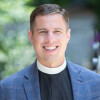Earlier this week, I finished the third season of Love, Victor, a touching coming-of-age drama about an openly gay high school student's forays into romance (warning: spoilers ahead!). In the season's final episode, Victor receives the "bravery award" at his school's athletic banquet. Initially, Victor is hesitant to accept the award. He knows that "bravery" was a euphemism for "gay" and he doesn't want to be seen as just the "gay kid." He is a skilled basketball player and would prefer to be recognized for his talent. He doesn't want to be limited to his sexuality.
Rahim, a more flamboyant friend of Victor's, successfully persuades Victor to accept the award. "You don't want the team to give you an award because you're tired of being Gay Victor," Rahim says, "[but] some of us can't hide it. You say you're out and proud, but you're out and proud on your own terms." Victor, Rahim suggests, could help other, more vulnerable kids, simply by being willing to publicly celebrate his identity.
I've been openly gay since I myself was in high school, but, like Victor, I, too, go through times in which I catch myself trying to minimize the "gay" part of my identity. I'm proud to be gay, but I'm also a lot of other things: a runner, a singer, a friend, a son, a brother, a priest. My sexuality does not define me, at least in whole. It is not all of who I am.
Earlier this month, I found myself talking to a visitor to St. Bart's who was around my age. He was well-dressed, well-educated, and well-spoken. But he hailed from a much more conservative area of the country. And he wanted to know, with what I perceived to be genuine curiosity, why churches in New York City were so...? He couldn't come up with the word. "Progressive?" I asked. He nodded. He had noticed all the pride flags and our pride steps specifically. Though he himself had a gay friend, he just didn't think all of this acceptance was good for society. How could we possibly think Scripture justified this? Did we really want children to grow up believing that it was ok to be gay?
I tried my best to be even-handed. I told him all about the debates within the Anglican Communion over the past twenty years and assured him that there were still some other Episcopalians who shared his concerns. I acknowledged that a few Biblical passages posed legitimate challenges to LGBTQ+ affirming Christians, however fervently we tried to explain them away. I showed sympathy to his perspective, even as I defended our fundamental stance of inclusion. "We believe that love is at the core of the Gospel," I told him, "and that how we behave towards one another should first and foremost be informed by love."
Still, he kept pressing me to share my "personal" point of view rather than to speak on behalf of my employer. To be honest, I didn't really want to tell him that I was gay. It seemed uncomfortable and unnecessary--to inject my own concrete life so boldly into this conversation about a theoretical group of people. Once I did, however, the whole discussion shifted. He apologized for pushing me so hard. Suddenly, I was a human being and not an abstraction, and he no longer seemed as willing to dismiss me or people like me. I doubt I single-handedly convinced this man to totally change his mind--maybe he was just being polite?--but I'd like to think that something within him was altered because of our conversation.
Pride can get a little performative sometimes, especially in a place like New York City. It seems like everywhere you turn, there is an LGBTQ+ person and a Pride flag. How brave are we really being in standing up for LGBTQ+ people when LGBTQ+ identities are so trendy? How much of a stance are we actually taking if every major corporation and local politician says exactly the same things we say? Do we really need to be "the gay church" if nearly every other Protestant congregation in Manhattan is a "gay church" too?
But our witness to God's Radical Welcome definitely matters. As we continue to emerge from COVID, our city is once again full of visitors from places that may not be as accepting as our own. Though it's not always obvious, there's still a diversity of thought within our city, and our Pride flag could be a life-changing symbol for a child who hears homophobic or transphobic rhetoric at home. Sometimes even within the LGBTQ+ Community itself, queer people are pushed aside and marginalized because of their identity: trans and nonbinary individuals, those who are intersex or asexual, queer people of color, LGBTQ+ folks who live with disabilities or whose gender expression challenges societal expectations or whose body is "too big" to be widely considered as "desirable" or "attractive."
In June and in every month, it's important for us to say who we are and what we stand for. We never know who else is watching, and we may never know the difference we can make for someone else.


